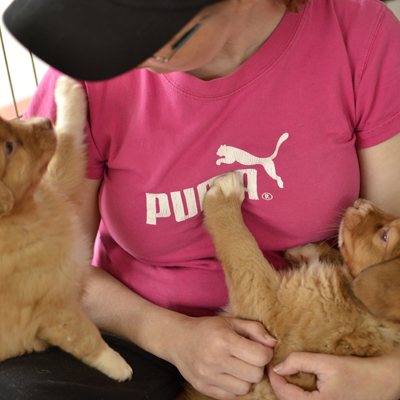So you're looking for a breeder, eh?

First thing first, all breeders are not the "same" Talk with your breeder by email and over the phone to build a build a relationship with your breeder. We suggest meeting your breeder at their home and visit the dogs and puppies - if a visit with your breeder isn't possible request information and pictures of the area the puppies are raised in. Most breeders will let you come and visit the puppies after 2-4weeks of age. Not visiting puppies prior to 2 weeks of age is vital for development and is intended to protect both the mother and puppies while they are newborns.
What are the long term goals of your breeder? Ask them about their plans for their breeding program and what their goals are for the future. There is no right answer to this question but the key is to make sure you are comfortable with the answer your breeder gives you. Keep in mind reputable breeders have a litter to improve the breed and will plan to keep a pup or more from a litter to achieve this goal.
Make sure you evaluate the breeder’s socialization and training program. Training programs are vital in producing a sound and versatile puppy. By the time puppies are 6-8 weeks old they should be friendly and outgoing with people and other animals and readily accept any new situation they may find themselves in.
Ask the breeder what they anticipate the temperament of their litter to be. Your breeder should be able to give you an idea of what the temperament of an upcoming litter will be based on the pedigree. If the pups are on the ground the breeder should start seeing temperaments develope as early as 4 weeks of age!
What age does your breeder let their puppies go to their new home? The average age should be 8-9 weeks. Puppies should not go to new homes before 8 weeks of age - in some US states this is a federal law! Getting a puppy between 9-12 weeks is the best age for a puppy as they learn valuable life lessons in the extra weeks spent with other dogs.
Ask your breeder what health problems they have encountered in their breeding program. If your breeder says their pedigree is "clean" or they haven't seen any health problems they are either uneducated or not telling the truth. The breed does have health concerns and no pedigree is free from genetic dissorders! We suggest reading the toller health page for information about genetic dissorders in tollers http://www.toller.ca/tollerhealth/Conditions.html
Request a copy of your breeders contract and review their health guarantees. Contracts are set up to protect you as a buyer as well as the seller and the overall health of your puppy. Many breeders contracts are extensive which helps ensure your dog is well covered. When it comes to health guarantees an average contract should cover your puppy for up until 24-30months of age against genetic dissorders.
Will your breeder take back the puppy if you are unable to keep it? Reputable breeders will always want to make sure their puppies have a good home. Because of this, they will be more then willing to take your puppy back and find him/her a nice home if you can no longer take care of it. They won't want to chance letting one of their puppies being dumped in a shelter later on down the road.
When you meet your breeder ask yourself, are their dogs happy, healthy and social? and are these people I can work with? You need to be comfortable working with your breeder for the lifetime of your dog. Expect your breeder to be choosy, ask you a lot of questions and/or provide you with a questionnaire to help get to know your family better.
Which club should my breeder be a member of? make sure your breeder is a member of the Canadian Kennel Club. The Canadian Kennel Club website advertises a list of breeders who are premier members in good standing with the club who may have puppies available (http://www.ckc.ca/en/Default.aspx?tabid=493)
The Nova Scotia Duck Tolling Retreiver Club of Canada and the NSDTRC-USA also can provide you with a list of breeders to contact as well as provide you with information about the breed. Remember, a breeder who is part of this club isn't always a "reputable" breeder, just as one who is not part of the club isn't always a "un-reputable" breeder. There are a number of reasons a person may decide not to become a member of these clubs. So remember, do your research and ask questions before making judgements!
Good Luck!
